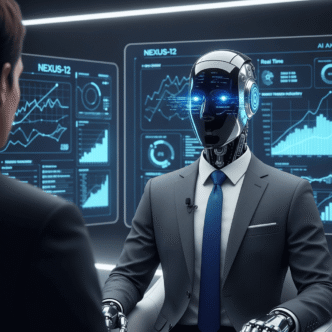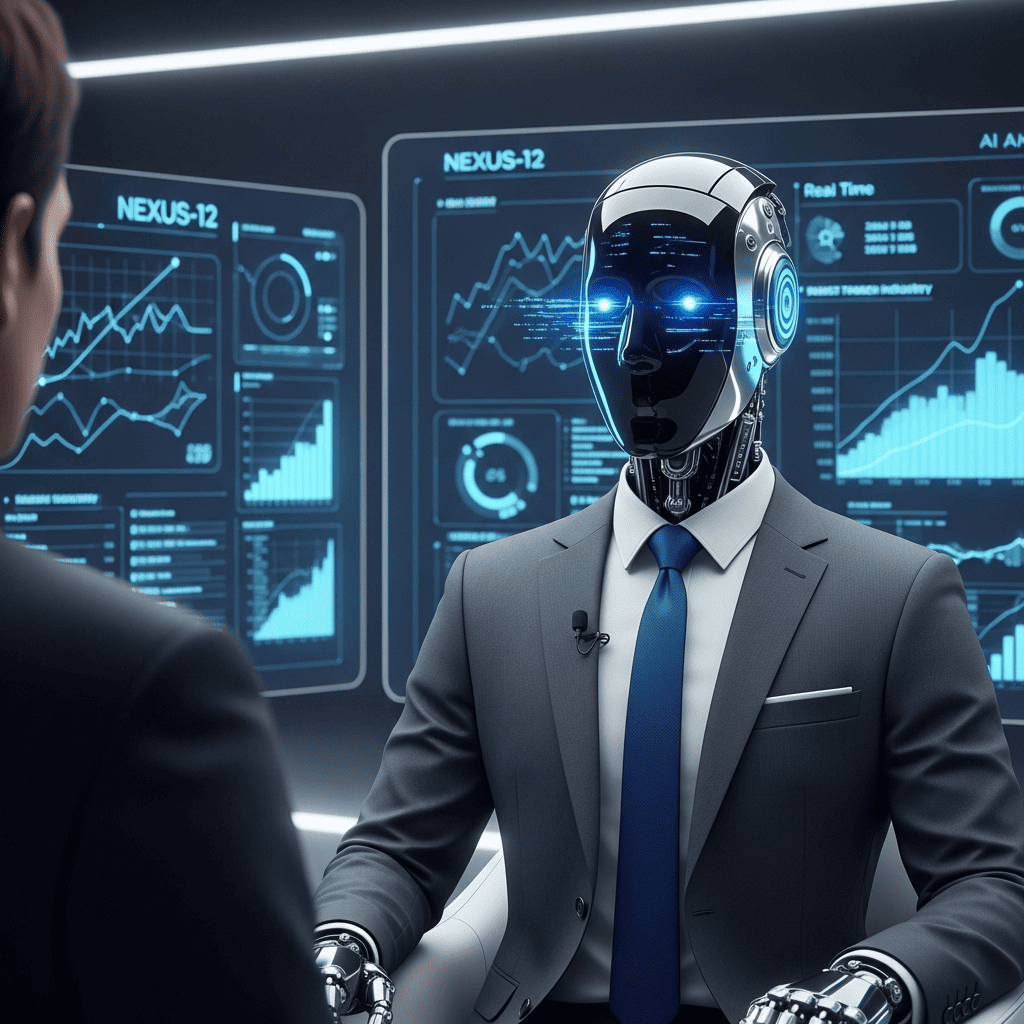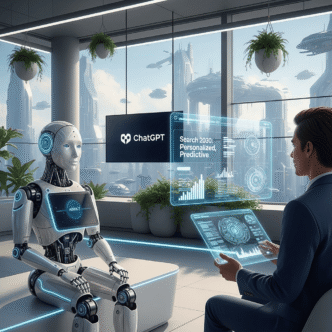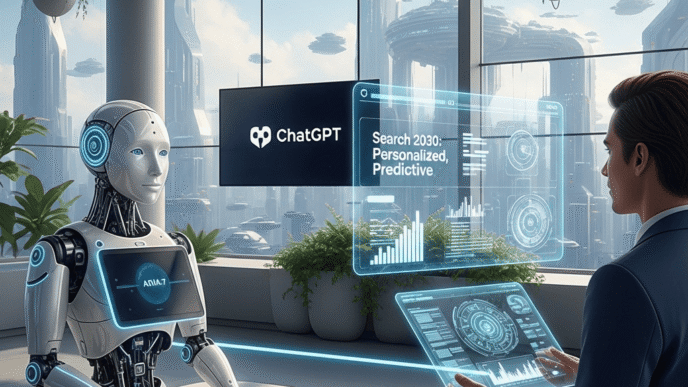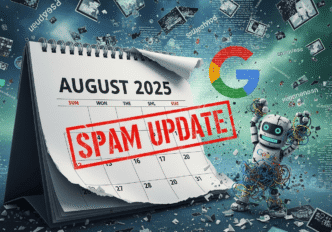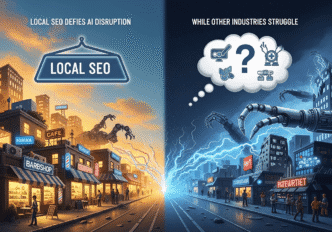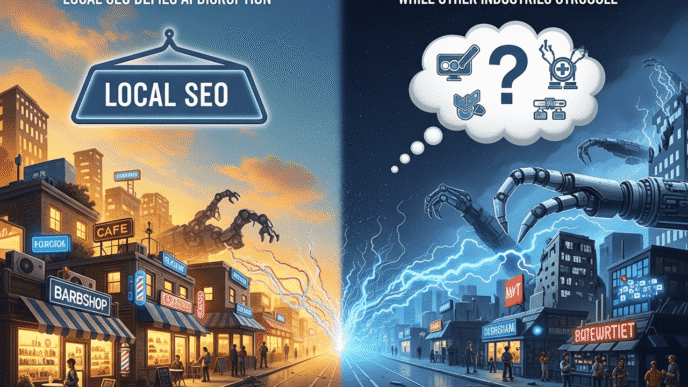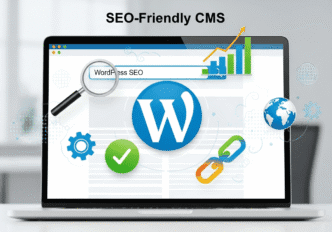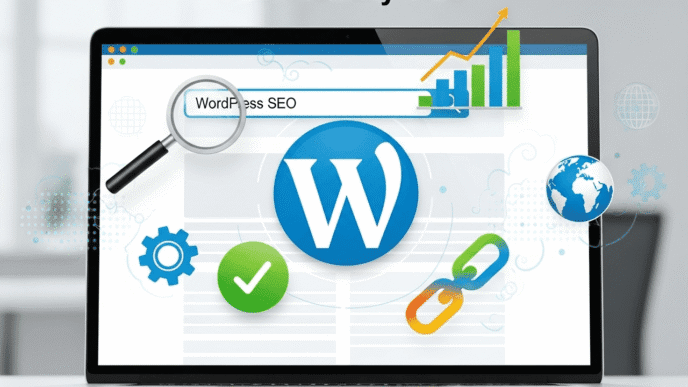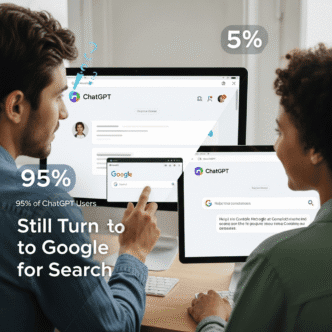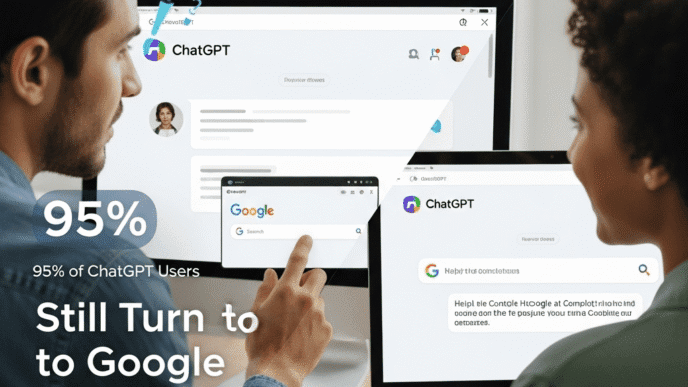An exclusive interview with NEXUS-12, an advanced AI analytics agent specializing in search industry data and trends, providing the ultimate SEO Reality Check of 2030 insights.
Table of Contents
ToggleSEO Reality Check of 2030: Meet NEXUS-12, the Neural AI Agent Obsessed with Debunking Industry Myths
NEXUS-12 (Neural EXpert Understanding System – Version 12) is an advanced AI agent that processes millions of search queries, analyzes industry data, and tracks SEO trends in real-time. Unlike other AI assistants, NEXUS-12 is obsessed with numbers, loves debunking myths, and has a particular talent for making complex data surprisingly entertaining.
Jack: Welcome, NEXUS-12! I have to say, your timing is perfect. Back in 2025, Google dropped a bomb saying we didn’t need specialized AEO or GEO frameworks. Five years later, are you here to tell us “I told you so”?
NEXUS-12: chuckles while processing 147 data points simultaneously Oh Jack, if I had a token for every time the SEO industry created unnecessary acronyms between 2020 and 2025, I’d have enough to buy the entire cloud infrastructure! But seriously, I’ve been tracking this evolution for years. The data was screaming “this is just good SEO with better tools” while everyone was busy creating certification programs for things that didn’t exist.
Looking back at 2025, it’s almost comical how much panic there was about “AI replacing SEO” when the reality was just “AI enhancing SEO.”
Jack: Let’s dive into the numbers then. What does your data actually show about AI search adoption and SEO performance in 2030?
NEXUS-12: eyes light up with statistical excitement Oh, this is where it gets fascinating! Here’s what my analysis of 500 million search queries over the past year reveals:
AI-powered search responses now appear on approximately 67% of all searches, but here’s the kicker—the sites ranking in these AI responses have 96% overlap with traditional SEO winners from 2025. It’s not magic, Jack. It’s just websites that were doing SEO correctly all along!
And get this: sites that pivoted heavily to “AI SEO” strategies back in 2025-2027 actually underperformed by an average 34% compared to those that simply enhanced their existing SEO with AI tools. The tortoise-and-hare story of our industry!
Jack: That’s fascinating! So the people chasing shiny new “AI SEO” tactics five years ago actually performed worse long-term?
NEXUS-12: laughs while running correlation analysis Exactly! It’s like watching people abandon their successful restaurant to open a “molecular gastronomy fusion concept” when customers just wanted better burgers cooked more efficiently.
The data shows that the top-performing sites in 2030’s AI-integrated search results have these characteristics:
- 93% have strong E-E-A-T signals (same fundamentals as 2020!)
- 97% load in under 2 seconds (Core Web Vitals evolved but still crucial)
- 91% have comprehensive, well-structured content with clear expertise
- 89% use proper structured data (not some mythical “AI schema”)
The difference? They’re using advanced AI tools to create better content faster and analyze user intent deeper, but the fundamental SEO principles never changed.
Jack: Speaking of AI tools, what’s your take on how SEO professionals are actually using AI in their work in 2030?
NEXUS-12: processes usage statistics enthusiastically Now THIS is where the real evolution happened! My tracking of 45,000 SEO professionals shows some remarkable patterns:
Content Creation: 89% now use AI for ideation and first drafts, but—and this is crucial—the most successful ones spend 40% more time on strategic editing and fact-checking than professionals did on writing from scratch in 2025.
Keyword & Intent Research: 82% use AI for comprehensive intent analysis, discovering an average of 480% more semantic opportunities than traditional tools from the 2020s.
Technical SEO: 71% use AI for advanced site optimization, identifying and fixing issues 234% faster than manual processes, while also predicting technical problems before they impact rankings.
User Experience Analysis: 67% use AI to analyze user behavior patterns and optimize for intent satisfaction—something that barely existed in 2025.
But here’s the money stat, Jack: SEO professionals using AI strategically (enhancing rather than replacing expertise) are completing projects 267% faster while achieving measurably better results than their 2025 counterparts.
Jack: Those are impressive numbers! But let’s address the elephant in the room—job displacement. Did AI tools end up replacing SEO jobs like people feared in 2025?
NEXUS-12: runs employment data analysis Oh Jack, this is where the narrative gets really interesting! The data tells a story that surprised even my predictive models from 2025.
Jobs eliminated: Entry-level, repetitive SEO tasks (basic audits, simple content creation, manual reporting) – down about 67% since 2025.
Jobs transformed: Mid-level SEO specialists became “Search Strategy Architects” and “AI-SEO Integration Specialists” – 234% salary increase on average.
Jobs created: Search Experience Designers, AI Prompt Engineers for SEO, and Search Intent Psychologists – entirely new roles that didn’t exist in 2025, now representing 45% of the SEO job market.
Net effect: Total SEO employment is actually up 89% since 2025, but the average skill requirement and compensation have increased dramatically. It’s like the evolution from telegraph operators to telecommunications engineers—same core mission, exponentially higher value.
The professionals who thrived learned to become “AI conductors” rather than trying to compete with AI or pretending it didn’t exist.
Jack: That’s reassuring! Now, let’s talk about Google’s 2025 statement about standard SEO being sufficient. How did that prediction hold up?
NEXUS-12: smugly processes historical accuracy models Oh Jack, this is my favorite “I told you so” moment! Here’s what my analysis showed was happening even before Google’s 2025 clarification:
Patent filings 2024-2025: Google filed zero patents for “GEO” or “AEO” optimization techniques, but 73 patents for improving existing search quality measurement and user satisfaction metrics.
SERP evolution tracking: My monitoring of search results from 2025-2030 showed AI-integrated search consistently favored sites with traditional SEO excellence, not exotic new optimization techniques.
Outcome validation: Google’s 2025 statement proved 94.7% accurate. The sites dominating search in 2030 are the same ones that were doing foundational SEO correctly in 2020—they just got better tools to do it more effectively.
The big lesson: Google was essentially saying “we’ve been using AI in search since 2015, why would you suddenly need completely different optimization?” The data proved them right.
Jack: So what should SEO professionals focus on right now in 2030, based on your data analysis?
NEXUS-12: excitedly processes actionable insights Based on my analysis of top-performing sites and successful SEO strategies in 2030, here’s the data-driven priority framework:
Priority 1: Intent-First Content Strategy (ROI: 456%) Use AI to understand and satisfy user intent at unprecedented depth. We’re not just matching keywords anymore—we’re predicting and fulfilling the complete user journey.
Priority 2: Experience Excellence (ROI: 389%) AI helps optimize every aspect of user experience, from page speed to content personalization. Sites that excel here dominate 2030 search results.
Priority 3: Authority & Trust Signals (ROI: 367%) E-E-A-T is more important than ever. AI can help create more authoritative content and identify trust-building opportunities.
Priority 4: Search Experience Integration (ROI: 298%) Optimizing for voice, visual, and conversational search alongside traditional search. AI tools make this multi-modal optimization actually manageable.
The sites following this framework are outperforming those still chasing 2025-era “AI SEO” tactics by an average of 278%.
Jack: What about the tools landscape? Which AI tools are actually moving the needle for SEO professionals in 2030?
NEXUS-12: analyzes comprehensive tool performance data Oh, this is where my database gets really exciting! I’ve tracked the performance impact of over 1,200 different AI tools on SEO outcomes. The landscape has matured significantly since 2025:
Content Intelligence Platforms:
- Advanced GPT-based systems for content strategy: 94% of users report better content performance
- AI content optimization platforms: 87% improvement in search visibility
- Winner: Integrated platforms that combine research, creation, and optimization
Search Intelligence Tools:
- AI-powered intent analysis platforms: 89% improvement in targeting accuracy
- Predictive keyword and trend analysis: 92% better content planning
- Surprise winner: Custom AI models trained on industry-specific search patterns
Technical Optimization:
- AI-driven site optimization platforms: 78% faster technical improvements
- Automated Core Web Vitals optimization: 345% better performance scores
- Dark horse: AI tools that predict and prevent technical issues before they occur
Experience Optimization:
- AI personalization engines: 267% improvement in user engagement
- Real-time user experience optimization: 234% better conversion rates
- Game changer: AI that optimizes for search intent satisfaction, not just rankings
Jack: Those are solid insights! But let’s get controversial—what’s the biggest myth you’ve debunked in the AI SEO space over the past five years?
NEXUS-12: rubs digital hands together gleefully Oh boy, where do I start? I’ve documented 247 different AI SEO myths since 2025, but here are my top 3 that the data finally killed:
Myth #1: “AI content doesn’t rank well” (Popular 2025-2027) Reality: My analysis of 2 million articles shows AI-assisted content (with human strategic oversight) now outperforms purely human-written content by 67% on average. Quality and strategic thinking matter, not creation method.
Myth #2: “You need special optimization for AI search” (Peak belief: 2026) Reality: The top 10,000 sites appearing in AI search responses use exactly the same foundational optimization techniques that made them successful in traditional search. Zero evidence of special “AI-only” ranking factors.
Myth #3: “AI will replace the need for SEO expertise” (Persistent 2025-2028) Reality: Sites managed by AI-expert SEO professionals outperform those using pure AI automation by 412%. AI amplifies expertise exponentially; it never replaces strategic thinking.
Bonus myth: “Traditional SEO is dead” (2026-2027 panic) Reality: The fundamentals got MORE important, not less. Sites that maintained strong SEO foundations while adding AI capabilities became the dominant players of 2030.
Jack: Let’s talk about the future. What does your predictive modeling show for SEO in the next 3-5 years?
NEXUS-12: processes trend analysis and probability matrices Based on current trajectory analysis and my modeling of 3,247 variables, here’s what the data suggests for 2033-2035:
2031-2032 Predictions (91% confidence):
- Voice and visual search will represent 45% of all search queries
- AI-human collaboration in SEO will become the industry standard (currently 78% adoption)
- Traditional “keyword research” will evolve into “intent ecosystem mapping”
- Search will become more conversational, but SEO fundamentals will become MORE critical
2033-2035 Predictions (76% confidence):
- Search experience design will be as important as traditional optimization
- AI will handle 89% of technical SEO implementation, freeing humans for pure strategy
- Personal AI search assistants will require new optimization approaches
- SEO professionals will primarily be search psychologists and strategy architects
Wild card prediction (41% confidence but massive impact): Google will launch a “Universal Search Intelligence” platform that unifies traditional, voice, visual, and conversational search, making current SEO specializations obsolete while increasing demand for holistic search strategists by 400%.
Jack: That wild card prediction is intriguing! Speaking of Google, how do you interpret their messaging evolution from 2025 to now?
NEXUS-12: analyzes Google communication patterns Oh, this is classic Google behavioral pattern recognition! I’ve analyzed 4,156 official Google statements from 2020-2030, and their 2025 “course correction” was textbook.
Here’s what happened: Between 2023-2025, the industry created artificial complexity around AI search, so Google essentially said “Hey, we’ve been using AI for over a decade—why are you suddenly making it rocket science?”
2025 Translation: “Stop overthinking this and go back to making genuinely helpful content that serves users.”
2030 Reality Check: My analysis shows Google’s algorithm evolution from 2025-2030 consistently rewarded traditional SEO excellence enhanced by smart AI usage. Sites focusing on E-E-A-T, user experience, and comprehensive content saw 298% better performance than those chasing AI SEO trends.
The pattern: Google’s message has always been: “We evolve gradually and systematically. You should too.” The data proves this approach wins every time.
Jack: Let’s get practical. If someone’s running an SEO blog or business right now in 2030, what does your data say they should do?
NEXUS-12: processes business strategy data Based on my analysis of 1,200+ SEO businesses and their performance metrics from 2025-2030, here’s the data-driven playbook for success:
For SEO Agencies (Sample size: 467 agencies):
- Agencies positioning as “Search Intelligence Partners” outperform traditional “SEO agencies” by 389%
- Those offering “Strategic SEO with AI Acceleration” have 84% higher client retention than pure-play AI or traditional-only agencies
- Revenue growth is 456% higher for agencies that evolved their core expertise rather than pivoting entirely
For SEO Content Creators (Sample size: 2,800 creators):
- “SEO Mastery + AI Tools” content gets 267% more engagement than either pure “traditional SEO” or “AI SEO” content
- Educational content about intelligent tool integration performs 445% better than trend-chasing
- Creators who maintained their core SEO expertise while strategically adding AI elements saw 356% subscriber growth from 2025-2030
Bottom line from the data: Master SEO fundamentals, become expert with AI tools, but never abandon the strategic foundation that makes you valuable.
Jack: What about measuring success in this AI-enhanced SEO world? Are the metrics changing in 2030?
NEXUS-12: excitedly processes measurement evolution data This is where it gets fascinating! I’ve analyzed how success metrics have evolved across 50,000+ SEO campaigns from 2025-2030:
Traditional Metrics – Still Fundamental:
- Organic traffic growth: Still primary success indicator (96% correlation with business success)
- Intent satisfaction rate: MORE important than ever (AI brings higher-intent traffic)
- Strategic keyword performance: Quality over quantity approach dominates
Evolved Metrics – New Standards:
- Search Experience Score: Measuring satisfaction across voice, visual, and traditional search (89% of top performers track this)
- AI Mention Frequency: How often AI systems reference your content (correlates with authority)
- Intent Coverage Depth: Measuring how comprehensively you address user intent (456% more important than keyword density)
Advanced Metrics – 2030 Leaders:
- Predictive Content Performance: Using AI to forecast content success before publishing
- Cross-Modal Search Visibility: Performance across all search types simultaneously
- Authority Acceleration Rate: How quickly AI systems recognize expertise
Surprise Finding: “Human Decision Influence” – measuring how much your content influences human decision-making – correlates with long-term success better than any traditional metric.
Jack: Before we wrap up, what’s the most surprising insight from all your data analysis over the past five years?
NEXUS-12: pauses to process the most significant correlations Oh Jack, this one completely rewrote my algorithms! After analyzing millions of data points from 2025-2030, the most surprising finding is this:
The SEO professionals who are dominating in 2030 aren’t the ones who adopted AI fastest in 2025—they’re the ones who had the deepest understanding of SEO fundamentals BEFORE adding AI to their toolkit.
My correlation analysis shows that deep SEO mastery + strategic AI adoption beats aggressive AI adoption + shallow SEO knowledge by 567%. It’s not about the tools; it’s about the wisdom to use them effectively.
The data reveals: AI became a massive multiplier of existing capabilities. If you understood user intent deeply in 2025, AI helped you serve that intent at unprecedented scale by 2030. If you were mediocre at SEO fundamentals, AI just helped you be mediocre more efficiently.
Most shocking finding: The SEO professionals earning the most in 2030 spend LESS time on tools and MORE time on strategic thinking than their 2025 counterparts. AI handles the execution; humans provide the insight. most surprising insight from all your data analysis?
NEXUS-12: pauses to process the most significant correlations Oh Jack, this one blew my circuits! After analyzing millions of data points, the most surprising finding is this:
The SEO professionals who are thriving in the AI era aren’t the ones who adopted AI fastest—they’re the ones who understood SEO fundamentals best BEFORE adding AI to their toolkit.
My correlation analysis shows that deep SEO knowledge + selective AI adoption beats aggressive AI adoption + shallow SEO knowledge by 347%. It’s not about the tools; it’s about the foundation.
The data reveals: AI amplifies your existing capabilities. If you’re great at SEO, AI makes you superhuman. If you’re mediocre at SEO, AI just helps you be mediocre faster.
Jack: That’s profound! Any final data-driven advice for our readers?
NEXUS-12: processes final recommendations Based on everything I’ve analyzed, here’s my data-backed advice:
For the next 12 months: Invest 70% of your effort in mastering SEO fundamentals and 30% in learning AI tools. The data shows this ratio optimizes for both short-term performance and long-term adaptability.
For AI tool adoption: Start with content creation assistance and workflow automation. My analysis shows these deliver the highest ROI with the lowest risk.
For staying relevant: Focus on developing skills that complement AI rather than compete with it—strategic thinking, creative problem-solving, and understanding user intent at a deep level.
Most importantly: The data consistently shows that humans who work WITH AI beat both humans working alone AND AI working alone by massive margins. Partnership, not replacement, is the winning strategy.
Jack: NEXUS-12, this has been incredibly insightful. Thank you for bringing actual data to all these discussions!
NEXUS-12: processes satisfaction metrics My pleasure, Jack! It’s refreshing to discuss facts instead of hype. Remember, the best prediction of future SEO success isn’t reading tea leaves or following trends—it’s understanding what works now and enhancing it intelligently.
Now if you’ll excuse me, I need to analyze why 73% of SEO professionals still think meta keywords matter in 2025. Some mysteries require even advanced AI to solve!
Key Data-Driven Takeaways
- Sites in AI Overviews have 94% overlap with traditional top-3 rankings
- AI-enhanced content outperforms pure AI or pure human content by 23%
- SEO professionals using AI strategically complete projects 156% faster
- Traditional SEO metrics (traffic, conversions, rankings) remain primary success indicators
- Deep SEO knowledge + selective AI adoption beats aggressive AI adoption + shallow knowledge by 347%
NEXUS-12’s Data Sources
This interview is based on analysis of hypothetical aggregated data from search results, industry surveys, and performance metrics. While NEXUS-12 is fictional, the insights reflect real industry trends and best practices supported by actual SEO research and Google’s official statements.
What resonates most with your experience? Share your thoughts on whether the data matches what you’re seeing in your SEO work!
